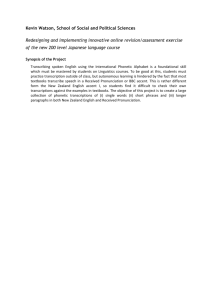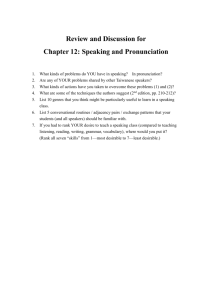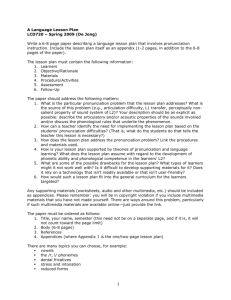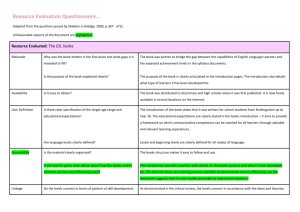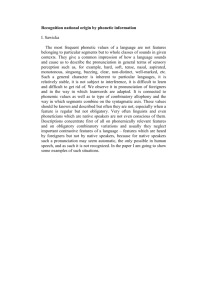Delta application form and pre-interview task
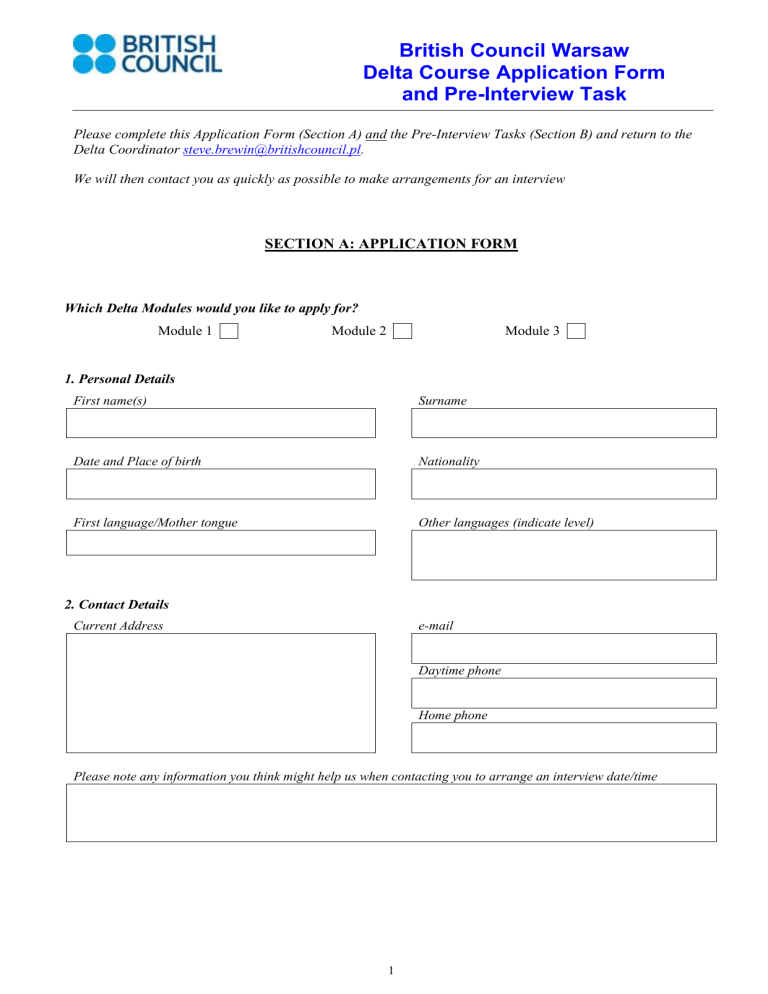
British Council Warsaw
Delta Course Application Form and Pre-Interview Task
Please complete this Application Form (Section A) and the Pre-Interview Tasks (Section B) and return to the
Delta Coordinator steve.brewin@britishcouncil.pl
.
We will then contact you as quickly as possible to make arrangements for an interview
SECTION A: APPLICATION FORM
Which Delta Modules would you like to apply for?
Module 1
1. Personal Details
First name(s)
Module 2
Surname
Module 3
Date and Place of birth
First language/Mother tongue Other languages (indicate level)
Nationality
2. Contact Details
Current Address e-mail
Daytime phone
Home phone
Please note any information you think might help us when contacting you to arrange an interview date/time
1
3a. Further/Higher Education
Please list the institution, dates, qualifications awarded and grades (include teaching qualifications)
3b.Other Training and Development
Conferences/Workshops/Short courses attended, publications, etc.
4a. ELT Teaching Experience
List current/most recent first (institution and dates). Indicate if full-time or part-time and state the levels, ages, class size and type(s) of course you taught at each institution
4b. Other Experience
List other (ie. non-ELT) teaching and/or work experience
2
5. Health
Do you have any illness or disability which could affect your performance on the course?
If ‘yes’, please specify below.
yes no
6. References
Provide contact details (phone and e-mail) for two referees. Say how long they have known you and in what capacity. At least one should be someone who can comment on your teaching.
7. How did you find out about the Delta Modules courses at the British Council Warsaw?
8. Declaration
I declare that the information I have given above in this Delta Modules Application Form is complete and accurate.
I agree to the Fundacja British Council collecting and processing my personal data for the administrative purposes connected with Delta. The Fundacja British Council is legally bound to process personal data only for specified purposes in a manner that is both confidential and secure
( Full Policy on Privacy in English ) ( Polish Personal Data Protection Act ).
Signature* Date
*You can type your name in this box. Typing your name here will be considered equivalent to a handwritten signature.
3
SECTION B: Pre-Interview Tasks
There are 4 pre-interview tasks to complete:
1.
Language Awareness
2.
Lesson Plan and Rationale for the Lesson Plan
3.
Supporting Essay (in which you outline your reasons for applying)
4.
Knowledge of Key Syllabus Areas (a brief self-evaluation)
The 4 tasks are to help us evaluate your suitability for the Delta Modules courses and your potential to complete these successfully. Your responses will also help us to suggest appropriate pre-course work and reading that you can do to help yourself prepare for the courses.
1. Language Awareness
In this task you need to comment on the form, meaning/use and pronunciation of certain words/phrases as used in a particular text.
Example
“We argue that more rigorous theorizing would speed up SLA [second language acquisition] research. Further, it might go some way towards protecting language teachers from seductive but inadequate ‘theory-based’ prescriptions for the classroom” (Larsen-Freeman and Long, 1991)
[Larsen-Freeman, D. and Long, M., 1991. An Introduction to Second Language Acquisition Research . Longman]
We … (line 1)
Form: Subject Pronoun (1 st person plural).
Meaning/Use: Refers to the authors (ie. Larsen-Freeman and Long). The use of subject pronouns can avoid the need of a lengthy noun phrase and/or reduce unnecessary repetition. Note that the reference here is to people/names not mentioned in the immediate text’ (ie. exophoric reference)
Pronunciation: / wi: / Not stressed in this context (so a weak form ) but the initial vowel in the following
‘argue’ will lead to linking (an intrusive / j /) and affect the vowel quality in ‘we’; /wi:
-ja:gju:/
Task
In response to the proposition ‘the best model for teaching pronunciation is RP (Received Pronunciation: the prestige accent of English)’, Thornbury (1997:156) writes: b) There is no ‘best model’. The fact is, however, that RP, while spoken by a very small minority of English speakers, is generally regarded as a ‘standard’ variety of British English for global communication and educational purposes. Native speakers are less likely to be surprised by a foreigner speaking with an RP accent than, say, a Glaswegian or broad Australian accent. And it may be the case that two non-native speakers having to speaking English together are more likely to be mutually intelligible if they have learned to speak with the same accent.
Nevertheless, for comprehension purposes it is obviously better if learners have been exposed to a wide variety of English accents. And, as was pointed out above in (a), it is unlikely that an adult non-native speaker is going to completely lose his or her original accent in favour of RP.
Thornbury, S. (1997) About Language . Cambridge University Press
Comment on the form, meaning/use and pronunciation of the language items in bold below as they are used in the above extract.
4
a) … is, however , that … (line 1) b) .., while spoken by … (line 1) c) … of British English for …(line 2) c) Native speakers are … (line 3) d) …or broad Australian accent. (line 4) e) … they have learned … (line 6) f) … better if learners have … (line 7) g) … was pointed out … (line 8) h) … is going to completely lose … (line 9)
5
2a. Lesson Plan
In the lesson plan template below, provide a lesson plan based on a lesson you have recently taught. The plan should be for a group of learners (with at least 3 learners in the class) and be between 45 and 90 mins in length.
The lesson can have either language or skills as the main focus but if a skills lesson, there must be some supporting language. Complete each box below in sufficient detail for us to be able to understand how the plan is to be implemented.
Attach materials as a separate file (.doc, .pdf or .jpeg file) and submit together with this application form and interview tasks.
--------------------------------------------------------------------------------------------------------------------------
Lesson Plan
No. of Learners Lesson Length Level of Class
Overall Lesson Aims/Objectives
Profile of Class and Course
Provide a brief profile of the class (eg. ages, nationalities/first languages) and course (eg. general English, intensive). Note any learning preferences and strengths/weaknesses of the learners that have a bearing on the planning.
Language Analysis
Provide analysis (meaning, form, pronunciation) of any language to be taught in the lesson.
Procedure
Provide sufficient detail here for us to easily understand how the lesson unfolds and develops.
Stage and Stage Aim Procedure Time
6
2b. Rationale for the Lesson Plan
Explain your rationale for the design of the lesson (eg. your reasons for the design/selection of the materials, tasks and activities, the ordering of stages, etc.). Write approximately 200 words.
3. Supporting Essay
Write a 250-350 word ‘essay’ on your reasons for wanting to do the Delta Module(s) and how you expect to benefit from the course(s).
4. Knowledge of Key Syllabus Areas
Relatively speaking, how confident are you in your current knowledge/abilities within the key syllabus areas below? Rank the syllabus areas from 1 to 8 in 4a and then in 4b (1=most confident; 8=least confident)
4a. Language systems and skills grammar lexis phonology discourse reading writing listening speaking
4b.Other key syllabus areas testing and evaluation course planning and syllabus design methods and approaches in ELT
1 st /2 nd language learning theories identifying lesson aims & aims of tasks/ activities
Lesson planning
Identifying materials likely learner problems evaluation, selection and design design and sequencing of tasks/ activities
7

